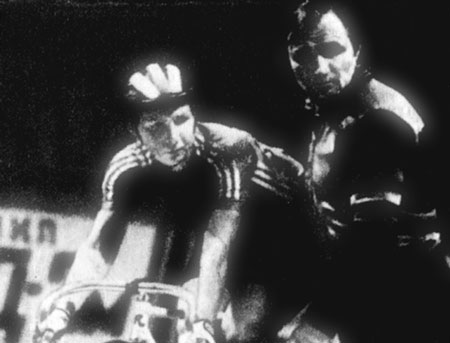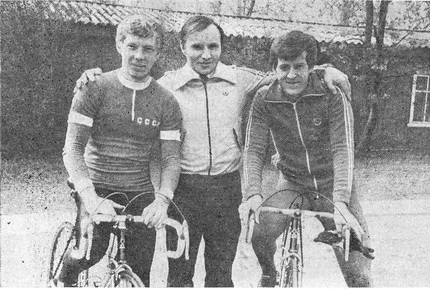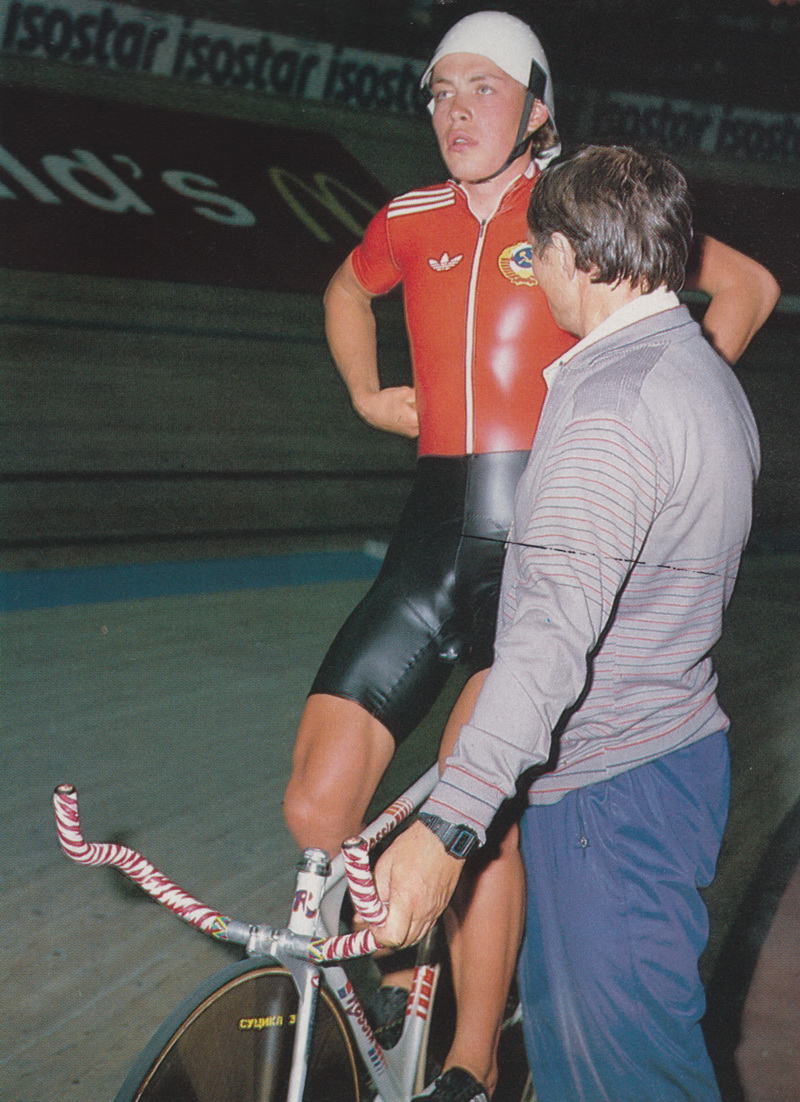Kuznetsov was born in 1941 in the eastern city of Dubrovka in the Bryanska Oblast, which presently sits up against Belarus. Kuznetsov's father was killed just months after he was born on the Eastern Front. Kuznetsov spent the majority of his youth in the Ukrainian town of Nikopol with his aunt where he worked as a turner in a pipe factory and started to become involved in cycling with the factory's team. Kuznetsov raced in his youth with the Dnipropetrovsk region team but at 23, he left for Leningrad (now known as Saint Petersburg) to continue school and started coaching with the voluntary Lokomotiv sports school, which was associated with the October Railway. The school, like the state-sponsored company, was centered in Leningrad and Kuznetsov got support by promising not just to make sports masters but champions.
 |
| Tsareva & Kuznetsov |
 |
| Kuznetsov flanked by two of his star pupils, Krasnov (l) and Manakov (r) |
While Kuznetsov's first major triumph was with his wife, his next big coup would be homegrown starting with a crop of riders from the Lokomotiv center in the late 70s including Viktor Manakov, Alexander Krasnov and Ivan Mishchenko. Kuznetsov and his team showed up at the 1978 all-Soviet championships and with a junior squad, they finished 3rd overall behind two teams that were the best senior Soviet men. Kuznetsov's boys pretty much took over the Soviet team pursuit team for the 1980 Moscow Olympics with Krasnov, Manakov and Vladimir Osokin, who became interested in cycling under Kuznetsov as a teen, were all selected. While the boycott took away some competition, the Soviets clocked an Olympic record time in the quarterfinals of 4'14" and then proceeded to dismantle the East Germany team to win the Olympic title. Krasnov and Manakov became cornerstones of the Soviet system for the rest of the decade while Kuznetsov would rise to the head of the Soviet cycling system along with the emergence of his biggest talent.
 |
| Kuznetsov holding up Eki, who is sporting a lovely rubber skinsuit. |
The racing was the easiest part of a Soviet rider's life. The training that Kuznetsov prescribed was ruthless. While younger riders just rode a couple of hours a day for 5 or so days a week, riders heading into the later junior ranks were thrown to the wolves and faced as many as 4 training sessions in a day. A ride before breakfast, a training session after breakfast, a training session after lunch and then a training session before dinner. This could happen daily no matter where you were at, be it in Leningrad or Dushanbe. Kuznetsov detested laziness and riders not living up to their potential. Injuries were one matter and could be understood but there would be no babysitting those that lacked motivation. It was either 100% or you were out of the program. There were stories of the staff getting the bikes out during layovers on transcontinental flights from Russia, where it was sub zero, to South America, where it was over 100F, and doing 1 or 2 hour full-gas training sessions before getting on the next flight. Riders like Ekimov thrived under this system (Ekimov kept Kuznetsov as his coach throughout his career) while others such as Evgeni Berzin began to rebel and were restless in a system "where you were not taught to think." Peter Post, who was known for his dictatorial style as a director and was Ekimov's first trade team director on Panasonic, was said to have deeply admired Kuznetsov.
Berzin and Vladislav Bobrik tried to leave the national team during the 1990 Tour Dupont in America after Bobrik led the race for 8 days but the pair were stopped. Post wanted to hire Berzin for '91 but the Soviets denied the transfer. Berzin was able to transfer to a Italian amateur team but had to pay half his meager salary to Kuznetsov and was called back mid-season. Berzin was able to escape the clutches of Kuznetsov and rode for the military team, CSKA Moscow, in '92 before transitioning to Italy. Berzin was a shoe-in for the Unified Team for the 1992 Barcelona but was blocked by Kuznetsov. The relationship was permanently severed.
Berzin did not mince words when he talked about his former coach. "I hate Kuznetsov. He is an old, straight Communist who tolerates no contradiction. In his school, we were nothing. We were isolated from the outside world. Watching television was taboo. You could not even talk to women...We did everything wrong, he did not."
While his style might have been too dictitorial and micro-managing for some, the results still came in. They won the Team Pursuit Gold Medal in 1988 in Seoul with Ekimov and wunderkind Dimitry Nelyubin, who was still a junior, along with three Lithuanians. Nelyubin, whose father, Vladimir, was one of the first Soviets to take on other Europeans outside of the Eastern Bloc, won the '89 Junior Worlds in the Pursuit and Team Pursuit. Berzin won the '90 Amateur World Championship in the Pursuit and the Soviets won the Team Pursuit. The track riders were exploding on the road with Ekimov winning the Vuelta a Tachira, Regio Tour, Tour de Normandie and three stages of the amateur Tour of Belgium in '88 while Nelyubin won the Tour of Belgium in '90 and others brought in a slew of stage wins.
Once Alfa Lum came in 1990, it was hard to keep riders. The collapse of the Soviet system saw the structure that Kuznetsov relied on disappear. No money. Riders and many coaches fled west. Kuznetsov led the Unified Team in 1992 but without any support, he had to look to the future. While remaining in St. Petersburg (having been renamed after the fall of communism) to keep his Lokosphinx club together, Kuznetsov had to move his winter training program after the team's base in Dushanbe collapsed after the fall. Thanks to Ekimov's original Panasonic contract, the club had some money to move to Mallorca but the island made things difficult and thanks to some contacts, they settled on an old poultry farm in Tortosa, Spain with roughly 10 to 25 thousand chickens. They converted the old chicken coops to hotel rooms and created a base that is still in use to this day. For the kids still in school, they would fly in teachers so that riders were able to train and study without stop.
While keeping operation going, Kuznetsov focused on the Atlanta Olympics with the team that included his son Nikolai and another young wunderkind in Alexei Markov. The 4-a-day training still persisted and in Atlanta, the first Russian Olympic team produced a silver medal.
While the Spanish operation was necessary as a warm weather base, Kuznetsov was constantly on the brink of personal financial ruin with the family nearing a point when Svetlana was an early teen where they began to question pulling out of tennis because it was too expensive. Svetlana started to win money thus it was a moot point and Kuznetsov got some breaks with some money backers but he was left in the cold twice.
In 2001, Kuznetsov got 1.5 million dollars for the new 2nd-tier Itera team, which was bankrolled by former cyclist Igor Makarov and organized in conjunction with the Russian cycling federation. Kuznetsov got some of the biggest talent including Pavel Brutt, Vladimir Karpets, Sergui Klimov, Alexei Markov, Alexander Serov and Kanstanstin Siutsou. It didn't even take two years before the project imploded due due to Makarov and the Russian Cycling Federation getting restless with Kuznetsov for not producing instant results. Kuznetsov told them five years before there would be a team that would be able to go into the Tour de France but after only two, Makarov and co. were looking elsewhere including a Belgian-Russian team piloted by the recently retired Andrei Tchmil, which never got off the ground.
 |
| The Student and the Master, Ekimov and Kuznetsov |
While Ekimov was going through the last stages of his career, Mikhail Ignatiev was just beginning his and was coming into the sport with as much hype as Ekimov. Ignatiev, under the tutelage of Kuznetsov, won the 2002 and 2003 Junior World Time Trial and possessed 4 Junior World Titles on the track. Still a junior, Ignatiev won the points race in the Sydney World Cup. Less than a year later at just 19, Iggy won the 2004 Olympic Points Race after lapping the pack 4 times to hold off Joan Llaneras. Kuznetsov, along with Ekimov getting the silver in the time trial, was back once again on the Olympic level. Ignatiev would dominate the Points Race on an international level for the next few years but would never again see the heights of his early youth.
Kuznetsov ran Lokomotiv through 2005 when a former student who had abandon the bike for business came to him with a proposition. Oleg Tinkov had made a fortune off beer after a pretty good junior career was stalled after his military service. He joined Kuznetsov in 2006 to form Tinkoff Restaurants, a tam of just 12 riders including one in Tinkov himself. The team itself was full of talent in Ignatiev, Nikolai Trusov, Alexander Serov, Pavel Brutt along with wunderkind Ivan Rovny. The aging Kuznetsov was played hard though and even after a successful year, Tinkov took 9 out of 11 riders (not including himself) from the Tinkoff Restaurants team to form Tinkoff Credit Systems while giving Kuznetsov the middle finger and taking all of the riders he had developed.
So what does a man nearing 70 do when a bat-shit crazy ex-rider takes away your riders? That's right, build a velodrome. Kuznetsov went back to Lokosphinx in St. Petersburg as the club was facing financial ruin at points but after her 2004 US Open win, Svetlana gave her father 1 million dollars to help finance the building of the Lokosphinx Cycle Sport Center while he got enough bank loans that he will be paying them off for the rest of his life. Kuznetsov was able to building a proper 250 meter track in St. Petersburg for the first time in his coaching career and even while he is at the end of his coaching days, the old man still works like a dog.
 |
| Still going at nearly 75 year old |
Alexander Kuznetsov was a cornerstone to the late Soviet sports system, especially since he was not in the proper national system. Kuznetsov's school made western riders cramp up just by the thought of having to do a team pursuit against the like of Ekimov, Nelyubin, Manakov, Krasnov, etc. If it was not for Alexander Kuznetsov, there would be no Viatcheslav Ekimov as we knew him. No Evgeni Berzin winning the Amateur World Championship in the pursuit. No Mikhail Ignatiev coming right out of the junior ranks to win an Olympic Gold. Kuznetsov was no fun loving coach. He made riders forget the pain and push to new levels. His work is still being felt and appreciated by many riders in the Russian system, especially since a proper 250 meter velodrome is in St. Petersburg thanks to him.
This is not an article to speculate about whether or not he doped any of his riders. He very may well have or maybe did not. I do not have any evidence of Kuznetsov carrying out some elaborate doping system. He wasn't perfect by any means but you cannot argue with results. Alexander Kuznetsov is a big reason Russian cycling got a fearsome reputation for riders that would dig tooth and nail as if they had nothing left to live for. His coaching career has spanned around 50 years and he has gained 7 Olympic Gold Medals and over 40 World Championships with his riders.
Yet if you were to go to his home, you would not see any medals or trophies on the walls. He doesn't care for large banquets or noisy feasts. He is a man of few pleasures and has no money savings to speak of as nearly every penny he has made has gone back into his riders, his club and into the development of cycling in St. Petersburg.
In the age of big egos, Kuznetsov is bit of an enigma and while there are many unanswered questions about his programs, his drive and relentless pursuit of development is certainly something that many could learn from.


Fascinating. Thank you.
ReplyDeleteFantastic article, Chris. Just came across it as part of some research on training methodologies. Excellent!
ReplyDeleteReliable end of year offer.
ReplyDeleteYou are a man, woman, young, old or want a lady financial institution Creditfiance provides you with a big promotion of financial assistance to all the individuals of the world who are in need to realize their projects for this end of the year or celebrated with their families.
Please contact us quickly so that we can take advantage of this great financial promotion.
Email: info@creditfinance-bank.com
Rolandgadner@outlook.de
WhatsApp number: +33784505888
Website: https://creditfinance-bank.com
I have learned a lot from your article, Thanks for this peace of mind that is worth millions of dollars.
ReplyDeleteOnly people with clean hearts can share these types of hidden information to the public freely, same as Hi-Tech programmers have been helping people around the world for obtaining from banks and lenders,
* Personal Loans
* Credit Card Loans
* Home Loans
* Car Loans
* Two-Wheeler Loans
* Small Business Loans
* Payday Loans
* Cash Advances
With their UNDETECTED FAKE BANK STATEMENTS still unknown to many individuals you can also join their 209.3k members TELEGRAM GROUP
to share your own opinion with the rest of the groups members.
Thanks once more for this powerful article.
Fascinating! I furnished Alexander Commander cycle tubing as part a sponsorship arrangement between True Temper and the Soviet Olympic Team for several years. I spent several days as Alexander’s guest in Leningrad about 1988. I would like to make contact with him again, can you help me?
ReplyDeleteRobert Koerber